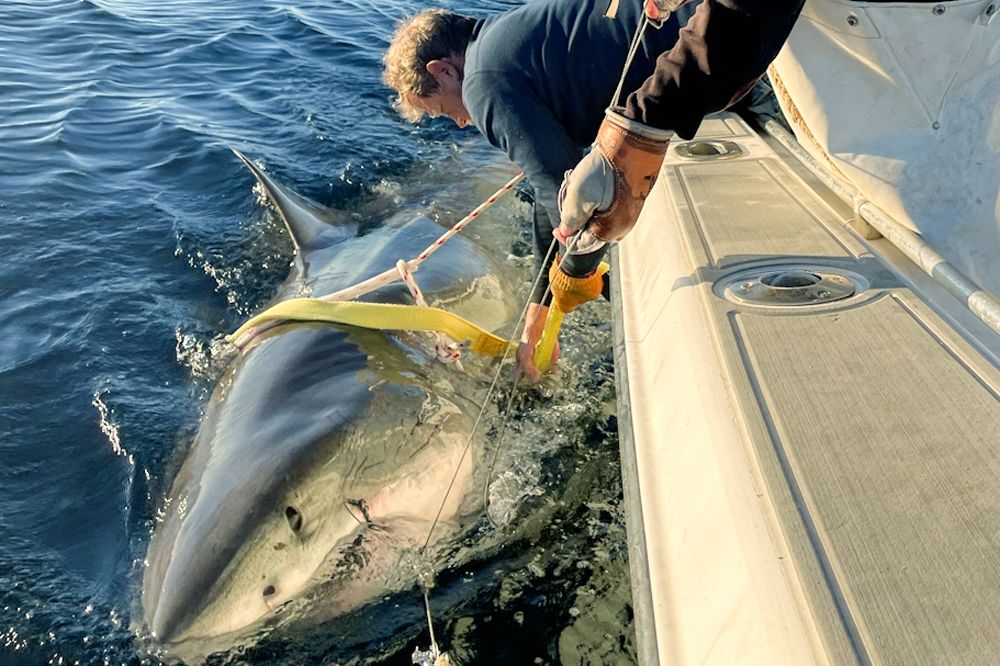Record-Breaking Great White Shark Spotted Off the Coast of Nantucket
A remarkable great white shark, measuring 13 feet and 9 inches in length and weighing an astonishing 1,653 pounds, has been spotted swimming off the coast of Nantucket, Massachusetts. This impressive creature, named Contender, has captured the attention of marine researchers and the public alike.
Contender was tagged by OCEARCH, a marine research nonprofit organization. The shark is being referred to as “the ultimate ocean warrior” by researchers, highlighting its size and strength. According to reports, Contender’s latest satellite ping placed it in waters east of Massachusetts, specifically between Nantucket Shoals and Georges Bank.
OCEARCH originally tagged the male shark in January off the coast of Georgia, approximately 45 miles offshore. Since then, Contender has traveled as far south as Florida before making its way back north. Before appearing near Nantucket, the shark was also tracked near Cape Hatteras on the North Carolina coast, as shared by OCEARCH on Instagram on June 10.
The SPOT tag deployed on Contender is expected to provide valuable real-time data for about five years. This will help researchers track the shark’s movements and gain a better understanding of its migration patterns. In addition to tracking, OCEARCH has collected important biological samples, including urogenital material, which are currently being analyzed.
The name “Contender” was chosen in honor of Contender Boats, a longtime partner of OCEARCH. The company’s industry-leading sport fishing and pleasure boats play a crucial role in supporting the organization’s research missions.
Tracking Contender’s Journey
OCEARCH has created an interactive travel log of Contender’s migration journey on their official website. This log allows users to follow the shark’s path and learn more about its movements over time. Researchers believe that such data can contribute significantly to the broader understanding of great white shark behavior and habitat use.
In addition to Contender, another great white shark was spotted near Cape Cod on July 4. Two paddleboarders observed the shark roughly 100 yards offshore from Stony Beach. This sighting highlights the increasing presence of great white sharks in the waters around Massachusetts.
According to WBZ News, the Atlantic White Shark Conservancy estimated that there were approximately 800 great white sharks in the waters surrounding Massachusetts between 2015 and 2018. This number reflects a growing population, which has led to increased sightings and awareness among local communities.
Importance of Research and Conservation
Marine research organizations like OCEARCH play a vital role in studying and conserving shark populations. By tagging and tracking sharks, scientists can gather critical information about their behavior, migration routes, and environmental preferences. This data helps inform conservation efforts and ensures that these apex predators continue to thrive in their natural habitats.
As technology advances, so does the ability to monitor and protect marine life. The use of satellite tags and other tracking devices provides real-time insights that were previously unavailable. These tools not only benefit scientific research but also help educate the public about the importance of preserving ocean ecosystems.
For those interested in following Contender’s journey, OCEARCH’s interactive travel log offers a unique opportunity to witness the shark’s movements firsthand. This kind of engagement fosters a deeper connection between people and the marine environment, encouraging greater support for conservation initiatives.
Conclusion
The discovery of Contender and other great white sharks in the waters of Massachusetts underscores the dynamic nature of marine ecosystems. As researchers continue to study these magnificent creatures, they gain valuable knowledge that can be used to protect and preserve them for future generations. With ongoing efforts and public support, the balance between human activity and marine life can be maintained, ensuring the survival of species like the great white shark.













88vin.stone
Just spun some reels on 88vin.stone. UI is solid, payouts aren’t too shabby. Definitely worth a punt. 88vin.stone